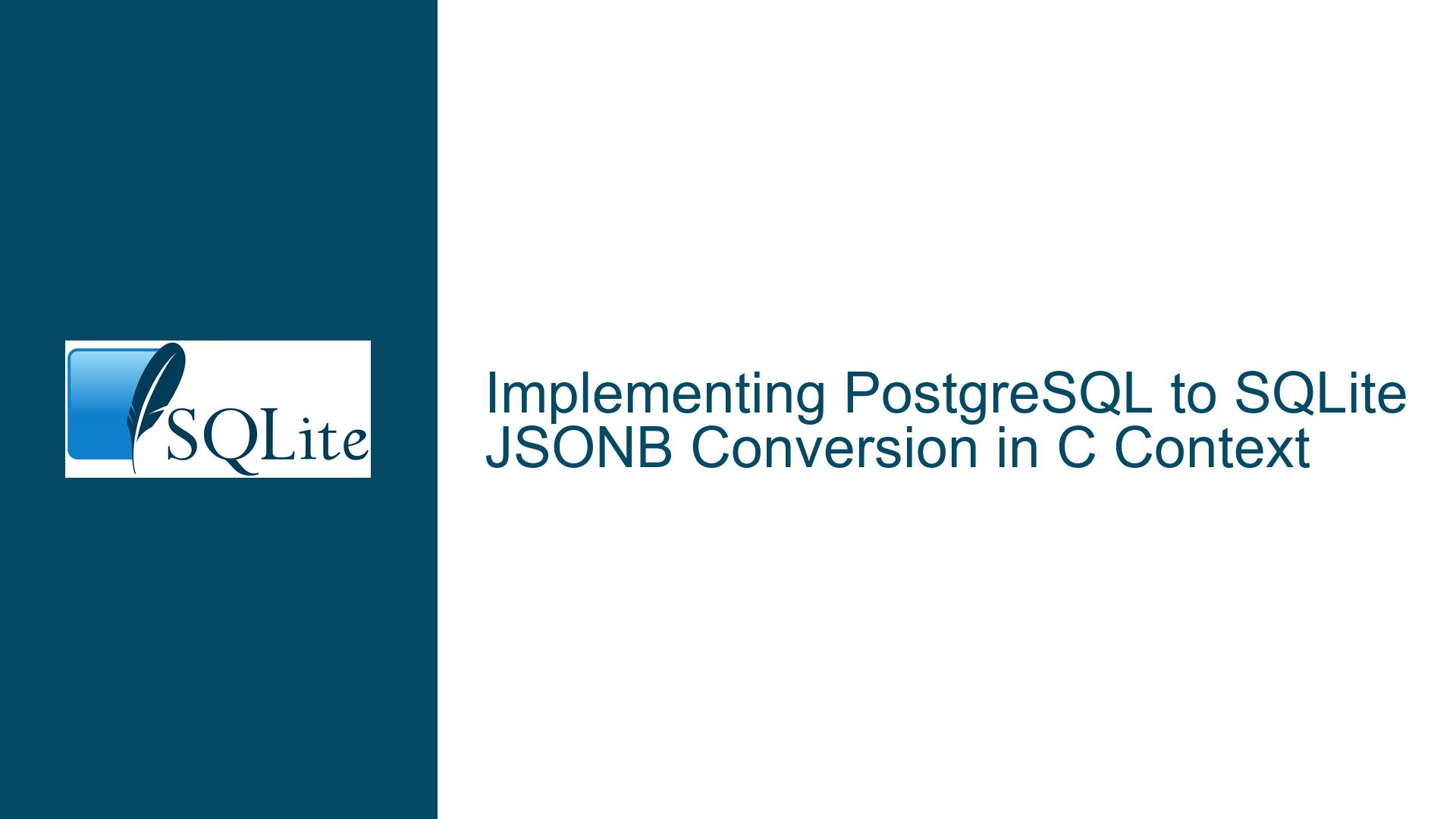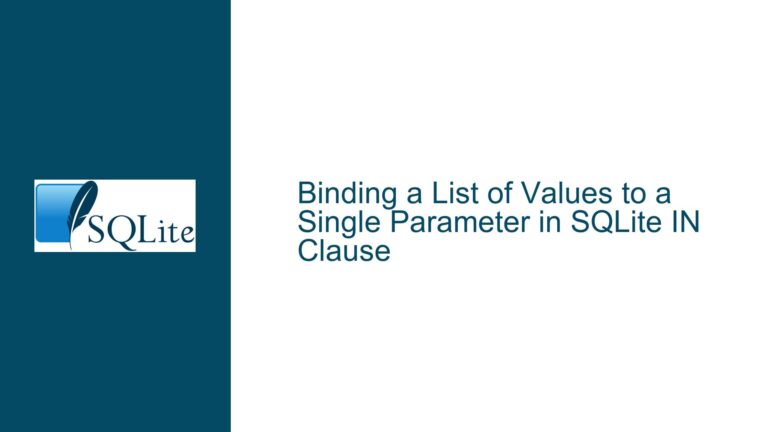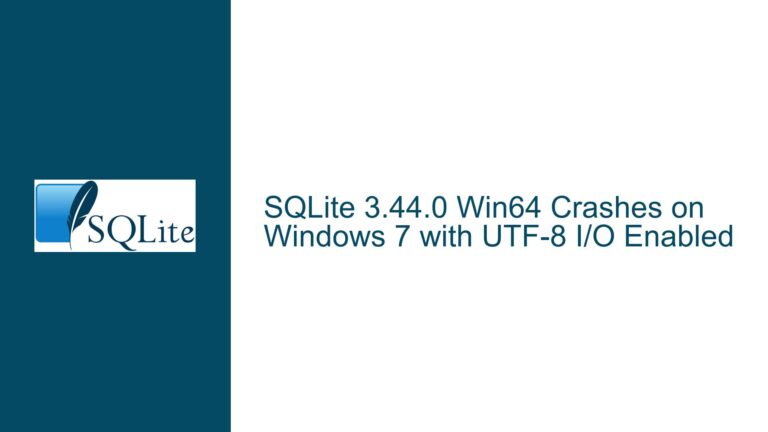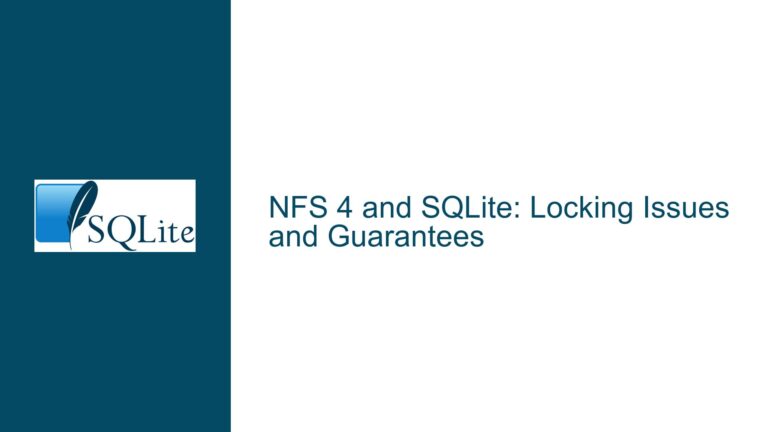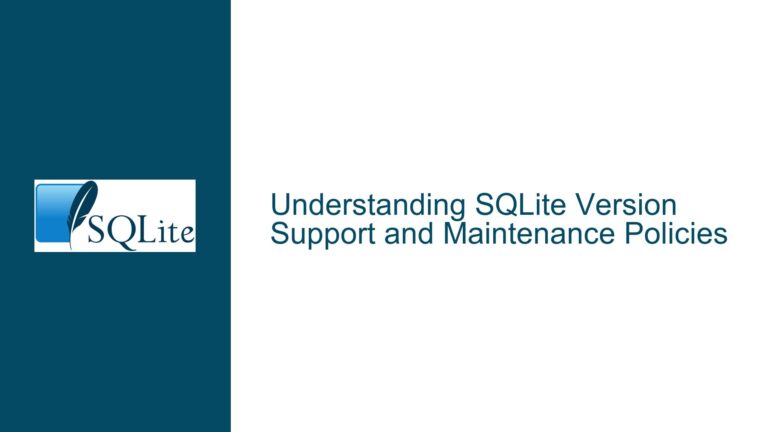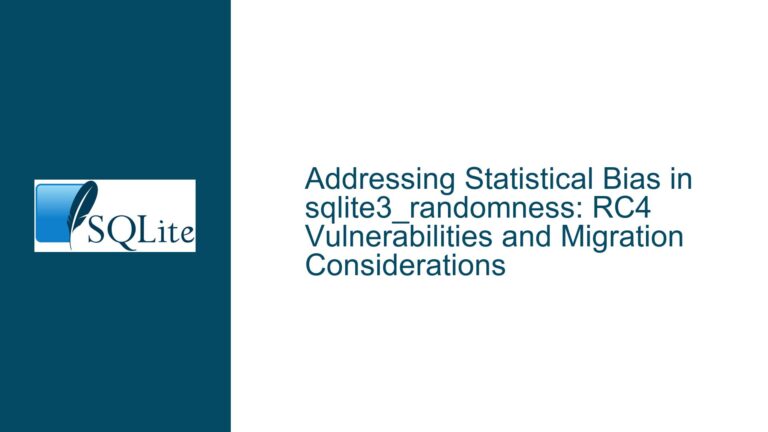Implementing PostgreSQL to SQLite JSONB Conversion in C Context
JSONB Conversion Challenges Between PostgreSQL and SQLite
The core issue revolves around the need to convert JSONB data from PostgreSQL into a format that SQLite can efficiently utilize. PostgreSQL and SQLite both support JSON and JSONB (binary JSON) formats, but their internal representations and handling mechanisms differ significantly. PostgreSQL’s JSONB is a well-documented, stable binary format optimized for storage and querying within PostgreSQL. SQLite’s JSONB, on the other hand, is designed for internal use and is not intended for external manipulation or reverse engineering. This discrepancy creates a challenge when attempting to bind PostgreSQL JSONB data to SQLite, especially in a Foreign Data Wrapper (FDW) context where direct C-level interactions are required.
The primary challenge lies in the fact that SQLite’s JSONB format is not exposed via public C APIs. This means that while SQLite provides functions like jsonb() at the SQL level, there is no direct C-level function to convert a text-based JSON string into SQLite’s internal JSONB format. This limitation forces developers to find workarounds, such as using in-memory databases or intermediate text-based JSON representations, which can introduce performance overhead and complexity.
Additionally, the lack of a direct C API for JSONB conversion means that developers must rely on SQL-level operations to achieve the desired transformation. This approach, while functional, is not ideal for high-performance scenarios or situations where low-level control over data binding is required. The absence of a clear, documented pathway for C-level JSONB conversion further complicates the issue, as developers must navigate undocumented or semi-documented internal SQLite functions and formats.
Risks of Relying on SQLite’s Internal JSONB Format
One of the most significant risks associated with attempting to convert PostgreSQL JSONB to SQLite JSONB is the reliance on SQLite’s internal JSONB format. As highlighted in the SQLite documentation, the JSONB format is intended for internal use by SQLite only. This means that the format is subject to change without notice, and any external code that relies on it may break when SQLite is updated. This risk is compounded by the fact that the JSONB format is not fully documented, making it difficult to ensure compatibility across different versions of SQLite.
Another risk is the potential for data corruption or loss during the conversion process. Since the JSONB format is not exposed via public APIs, any attempt to manipulate or convert JSONB data at the C level must rely on reverse-engineered or inferred knowledge of the format. This increases the likelihood of errors, especially if the conversion process involves complex or nested JSON structures. Furthermore, the lack of official documentation means that developers must rely on community knowledge or trial and error, which can lead to suboptimal or insecure implementations.
The reliance on SQL-level operations for JSONB conversion also introduces performance risks. Executing SQL queries to convert JSON data can be significantly slower than direct C-level manipulation, especially in high-throughput scenarios. This performance overhead can be particularly problematic in FDW contexts, where data binding and conversion must be performed frequently and efficiently. Additionally, the use of in-memory databases or intermediate text-based JSON representations can further exacerbate performance issues, as these approaches require additional memory and processing resources.
Strategies for Efficient JSONB Conversion in C Context
Given the challenges and risks associated with converting PostgreSQL JSONB to SQLite JSONB, several strategies can be employed to achieve efficient and reliable conversion in a C context. One approach is to use SQLite’s jsonb() function at the SQL level to perform the conversion. This involves constructing an SQL query that converts a text-based JSON string into SQLite’s internal JSONB format and then executing this query within an in-memory SQLite database. The resulting JSONB data can then be extracted and bound to the target SQLite statement using sqlite3_bind_blob.
Another strategy is to avoid relying on SQLite’s internal JSONB format altogether and instead use a text-based JSON representation for data interchange. This approach simplifies the conversion process, as it eliminates the need to deal with SQLite’s internal JSONB format. However, it may result in reduced performance, as text-based JSON is generally less efficient to store and query than binary JSON. Despite this drawback, using text-based JSON can be a viable option in scenarios where performance is not a critical concern or where the complexity of dealing with SQLite’s internal JSONB format outweighs the benefits.
A third strategy involves leveraging PostgreSQL’s JSONB unpacker functions to convert PostgreSQL JSONB data into a canonical text-based JSON format before passing it to SQLite. This approach ensures that the JSON data is in a consistent and well-documented format, reducing the risk of errors during the conversion process. Once the data is in text-based JSON format, it can be passed to SQLite and converted to JSONB using SQLite’s jsonb() function, as described earlier. This strategy combines the benefits of using a well-documented JSON format with the efficiency of SQLite’s internal JSONB representation.
Detailed Implementation of In-Memory JSONB Conversion
To implement the in-memory JSONB conversion strategy, the following steps can be taken:
Open an In-Memory SQLite Database: Create an in-memory SQLite database using
sqlite3_open_v2with theSQLITE_OPEN_MEMORYflag. This database will be used to perform the JSONB conversion without the overhead of disk I/O.Construct the Conversion Query: Build an SQL query that uses SQLite’s
jsonb()function to convert a text-based JSON string into SQLite’s internal JSONB format. The query should be constructed dynamically based on the input JSON string.Prepare and Execute the Query: Use
sqlite3_prepare_v2to prepare the conversion query andsqlite3_stepto execute it. The result of the query will be a BLOB containing the JSONB data.Extract and Bind the JSONB Data: Extract the JSONB data from the query result using
sqlite3_column_bloband bind it to the target SQLite statement usingsqlite3_bind_blob. Ensure that the BLOB is properly allocated and freed to avoid memory leaks.Handle Errors and Cleanup: Implement error handling to ensure that any issues during the conversion process are caught and handled appropriately. Clean up resources, such as the in-memory database and prepared statements, to avoid memory leaks and other resource-related issues.
Example Code for In-Memory JSONB Conversion
The following code snippet demonstrates how to implement the in-memory JSONB conversion strategy in C:
#include <sqlite3.h>
#include <stdio.h>
#include <stdlib.h>
#include <string.h>
typedef struct {
char *dat;
int len;
} blobOutput;
static inline blobOutput makeJSONb(char *s) {
int len = 0;
char *dat = NULL;
sqlite3 *conn = NULL;
int rc;
const char *err;
sqlite3_stmt *res;
char *query;
char *base = "select jsonb('%s') j;";
rc = sqlite3_open_v2("", &conn, SQLITE_OPEN_MEMORY | SQLITE_OPEN_READONLY, NULL);
if (rc != SQLITE_OK) {
sqlite3_close(conn);
fprintf(stderr, "Failed to open in-memory SQLite for JSONB creating, result code %d\n", rc);
exit(1);
}
query = malloc(strlen(s) + strlen(base));
sprintf(query, base, s);
rc = sqlite3_prepare_v2(conn, query, -1, &res, 0);
if (rc != SQLITE_OK) {
err = sqlite3_errmsg(conn);
sqlite3_close(conn);
free(query);
fprintf(stderr, "Failed to fetch JSONb, result code %d, error %s\n", rc, err);
exit(1);
}
rc = sqlite3_step(res);
if (rc == SQLITE_ROW) {
sqlite3_value *val = sqlite3_column_value(res, 0);
int sqlite_value_affinity = sqlite3_value_type(val);
const char *dat1 = sqlite3_value_blob(val);
if (sqlite_value_affinity != SQLITE_BLOB) {
sqlite3_finalize(res);
free(query);
sqlite3_close(conn);
fprintf(stderr, "Failed to fetch JSONb, not a BLOB result, affinity code %d, %s\n", sqlite_value_affinity, query);
exit(1);
}
len = sqlite3_column_bytes(res, 0);
dat = malloc(len + 1);
memcpy(dat, dat1, len);
}
sqlite3_finalize(res);
free(query);
sqlite3_close(conn);
return (blobOutput){dat, len};
}
int main() {
char *json_text = "{\"key\": \"value\"}";
blobOutput jsonb = makeJSONb(json_text);
printf("JSONB data: %.*s\n", jsonb.len, jsonb.dat);
free(jsonb.dat);
return 0;
}
Performance Considerations and Optimization
When implementing JSONB conversion in a C context, performance is a critical consideration. The use of in-memory databases and SQL-level operations can introduce significant overhead, especially in high-throughput scenarios. To mitigate this, several optimization strategies can be employed:
Batch Processing: Instead of converting JSONB data one record at a time, batch multiple records together and perform the conversion in a single operation. This reduces the overhead associated with opening and closing in-memory databases and preparing SQL queries.
Caching: Cache the results of JSONB conversions to avoid redundant processing. If the same JSON data is encountered multiple times, the cached JSONB data can be reused, reducing the need for repeated conversions.
Parallel Processing: Use multi-threading or parallel processing to perform JSONB conversions concurrently. This can significantly improve performance in scenarios where large volumes of JSON data need to be processed.
Minimize Memory Allocations: Reduce the number of memory allocations and deallocations by reusing buffers and memory pools. This can help minimize the overhead associated with dynamic memory management.
Profile and Optimize: Use profiling tools to identify performance bottlenecks and optimize the conversion process. Focus on areas where the most time is spent, such as SQL query execution or memory allocation.
Conclusion
Converting PostgreSQL JSONB to SQLite JSONB in a C context presents several challenges, including the lack of a public C API for JSONB conversion and the risks associated with relying on SQLite’s internal JSONB format. However, by employing strategies such as in-memory database conversion, text-based JSON interchange, and leveraging PostgreSQL’s JSONB unpacker functions, developers can achieve efficient and reliable JSONB conversion. Careful consideration of performance optimization techniques, such as batch processing, caching, and parallel processing, can further enhance the efficiency of the conversion process. Ultimately, the choice of strategy will depend on the specific requirements and constraints of the application, but with careful planning and implementation, it is possible to achieve seamless JSONB conversion between PostgreSQL and SQLite.
